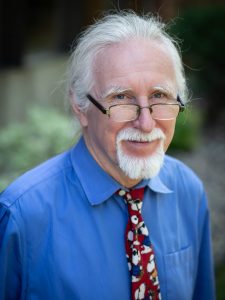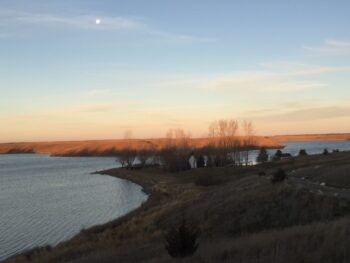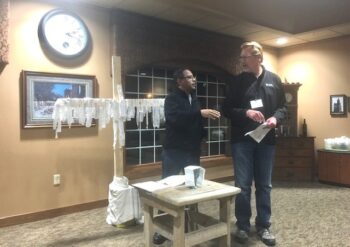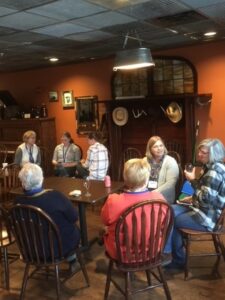 By Bob Hulteen
By Bob Hulteen
Region 3 of the ELCA (the nine synods of Minnesota, North Dakota, and South Dakota – or what Pastor John Hulden calls “the ‘otas”) pulls together the bishops’ staffs once a year for a three-day retreat to share information and talk about policies and programs that could be improved throughout the region. It’s a time to meet colleagues in ministry and talk shop, an opportunity that synod staff people don’t often have.
This week is the Region 3 gathering for 2023. It’s the first in-person meeting of the staffs since 2019. As you can imagine, there has been some turnover since then, including the election of four new bishops in the region. And, this year we are meeting at a new site – Luther Crest Bible Camp in Alexandria, Minnesota.

The view from previous years’ Region 3 Retreats at Joy Ranch in South Dakota.
I appreciate it when we gather. It’s good to have colleagues.
But, I am most thankful for the opportunity to hang with folks from our more rural synods. Having been born in a very small town in what is now the Northwestern Minnesota Synod, and having grown up in what is now the Western North Dakota Synod, I spend most of my time these days with people right here in the Minneapolis Area Synod. And, while there certainly is some diversity of thought within our little synod, I am challenged by the wide range of opinions in our synods where bishops sometimes drive four or five hours to install a new pastor.
IT’S NOT NOSTALGIA that draws me to hang out with my colleagues from these synods. At least, that’s not the only pull. These days I am aware of the great divide between urban and rural areas that separates and isolates us from each other.
When I ended up in inner-city Washington, D.C., in the early ‘80s through the Lutheran Volunteer Corps (in what is now the Metro DC Synod), I was confronted by urban poverty. And yet, the types of disinvestment from rural communities, where main streets were being decimated by an influx of box stores, was very familiar. The same impulses were driving an economic change in the most urban and most rural parts of our country, I realized.
As we have just completed an election cycle (and probably within days will enter the next one), we are aware of political motivation for creating division and isolation. Ads demonize and “otherize” folks who live in other parts of the state. And, there is so much money in campaigns that micro-advertising means the message is directed to people susceptible to have their fears or biases confirmed.

Time for worship together
Twitter storms that try to shame people for where and how they choose to live are common place. And, with a high degree of anonymity, we are able to stereotype and dismiss people who are essentially our neighbor … who are often facing similar economic struggles of economic disinvestment.
When I can spend time with my synodical colleagues, I have the chance to be reminded of the similarity of basic values, and I can begin to imagine discussions where we discuss a way to a shared future, where “we all do better when we all do better,” as my political hero used to say.
Recently Lisa Pruitt, Martin Luther King Jr. Professor of Law at the University of California Davis, was recently the featured speaker at the Westminster Town Hall Forum from Westminster Presbyterian Church in Minneapolis. She challenged the in-person and on-air listeners, especially those in urban areas, to rethink the ways they talk about rural residents. She wondered whether constructive conversations about a “fair share” of political power for rural people would mean urban-dwellers would treat rural folks with less contempt and anger. “The contempt and the anger are not serving city folks well, and they certainly are not rural folks well. So maybe it’s time to take a different tack,” she added. Quoting a New York Times article by Roger Cohen, she posited that New York and California don’t have a stranglehold on the truth any
more than Kansas and Missouri do.

Social time
We can ask the question: Do Minneapolis and Saint Paul have a stronger connection to truth than Waseca or Wadena? Or, in reverse, do Bemidji or Baudette better represent Minnesota values than the Twin Cities?
And, I wonder, no matter the answer to those questions, can the church, specifically the ELCA, do anything to reweave the web of society in Minnesota. Could our synod and one of the more rural synods engage in discussion that repairs distrust and counters division? Could they know we are Christians by our love?
Do we even want to take the risk for the sake of the gospel?
—————————
UPDATE: Drat, I caught a terrible cold and wasn’t able to go to Alexandria to be with my colleagues. (And, just to be explicit, I have been getting a negative COVID test every day since the day before election judging last week. It’s just a cold. But, no one wants to be around someone coughing and sneezing.)

